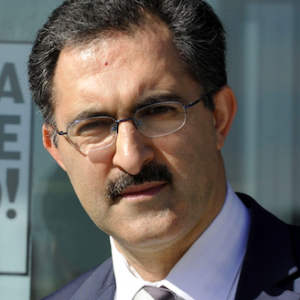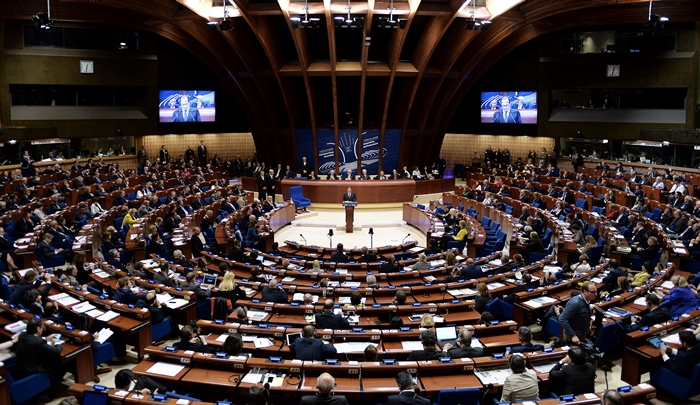by Abdullah Bozkurt
The Council of Europe (CoE), Europe’s largest intergovernmental body advocating democracy, the rule of law and fundamental rights, is facing a historic test in confronting a daring challenge by Islamist rulers who are bent on transforming Turkey from a secular parliamentary democracy to an autocratic state rooted in xenophobic political Islam.

Among the 47 nations of the CoE, Turkey, a founding member, tops the member states in combined figures for the number of jailed journalists. As of today, over 200 journalists are languishing in notorious Turkish prisons, most without even indictments or convictions on trumped-up charges of terror, espionage and an attempted coup. On an unprecedented scale, some 135,000 people, including doctors, teachers, judges, prosecutors and actors, were summarily dismissed from government jobs in the six months following the coup attempt with no evidence of any wrongdoing whatsoever. The dismissals were apparently based on unconstitutional profiling of unsuspecting citizens based on ethnicity, political affiliation, ideology or belonging to a particular social group.
The CoE’s monitoring bodies have been facing the increasingly daunting task of documenting rights violations in Turkey, with rapporteurs and delegations on fact-finding visits often prevented from meeting with jailed dissidents. Many interlocutors of the CoE are forced to live in exile, making it difficult to get a true picture of Turkey. Those who are still in Turkey are afraid of repercussions for meeting with CoE representatives and often engage in repeating the official government narrative that scapegoats critics and opponents for the failures of governance in Turkey so that they can be saved from the government’s wrath.
Norway’s Ingebjorg Godskesen and Estonia’s Marianne Mikko, co-rapporteurs for the Parliamentary Assembly of the Council of Europe (PACE), were prevented from visiting detained Kurdish lawmakers including the two co-chairs of the Peoples’ Democratic Party (HDP) during their visit to Turkey on Jan. 9-13, 2017. Both have expressed concerns about the serious deterioration of human rights in Turkey. Despite promises by the head of Turkey’s delegation to PACE, Mogens Jensen of Denmark, chairman of the ad hoc sub-committee on recent developments in Turkey, and his delegation were also prevented from paying a visit to HDP leaders during their Nov. 21-23, 2016 fact-finding visit to Ankara.
Another PACE rapporteur, Volodymyr Ariev of Ukraine, went to Turkey on Nov. 14 to look into the Turkish government’s crackdown on and jailing of journalists en masse. His visit was prompted by the fact that most alerts on the CoE Media Platform to promote the protection of journalism and safety of journalists have originated from a single member state, Turkey. Ariev, a journalist by profession who is leading PACE on a report about “attacks against journalists and media freedom in Europe,” called on Turkish authorities to release jailed journalists. Yet, since his visit more journalists have ended up in Turkish prisons, and alerts on the CoE Media Platform from Turkey continue to rise.
It is clear that the CoE’s engagement with Turkey is no longer working in the sense that no positive change can be detected in Turkish government behavior. In fact, the overtures by Secretary-General of the CoE Thorbjørn Jagland with his dictator friend sitting in a lavish, newly built 1,150-room palace in the Turkish capital are seen as an appeasement by many observers of the CoE. President Recep Tayyip Erdoğan takes these steps as a blank check for a crackdown on the very values espoused by the CoE. Perhaps the secretary-general is pleased that Turkey is funneling more cash to the CoE’s budget, with the expansion of seats at PACE from 12 to 18 deputies, providing some relief to the cash-strapped secretariat. But there is no justification for full-frontal assaults of unprecedented scale and magnitude by a member state on the rule of law, democratic principles and fundamental rights. Erdoğan is a candidate to become a 21st century version of Nazi Germany’s Hitler, and that is why critics and dissidents are fleeing Turkey in large numbers. Deputy Godskesen, a Norwegian as Jagland is, recently commented to the media that she would not think of going back to Turkey if she were a Turk living abroad.
The CoE must take a tougher line with respect to Erdoğan’s Turkey and move beyond merely expressing statements of concern by adopting policy actions ranging from formally placing it under a monitoring process to even challenging the democratic credentials of the Turkish delegation. This intergovernmental body should closely monitor and track all rights violations in Turkey to set the record clear for a future reckoning and for holding authorities accountable for what they have done to this nation of 80 million. It is important to see through the false official narrative coming out of Ankara that claims all these rights violations are justified because of the abortive coup of July 2016, which the CoE strongly condemned.
One of the leading figures in PACE who realized the game played by the Turkish government early on is Michael Jensen of Denmark, who told the assembly during a debate on Turkey on Oct. 13, 2016 that so much time was being spent talking about the coup attempt when everyone deplored the failed coup. He said, “What we should spend time on, however, is talking about the present situation of democracy, or the lack thereof, in Turkey.” He added that “perhaps the investigators in Turkey have some kind of special powers, because they knew only a few hours after the coup attempt that all those judges should be arrested for being involved in it,” referring to some 3,000 judges and prosecutors who were dismissed or arrested right after the coup attempt.
It turns out that Jensen was right. Erdoğan knew about the coup in advance and manipulated it in a controlled fashion to set up mass persecutions of his critics and opponents in Turkey. Both the main opposition leader Kemal Kılıçdaroğlu and pro-Kurdish party HDP leader Selahattin Demirtaş have made statements to that effect months after the attempt. Erdoğan has tried hard to suppress any coverage of investigations into the coup by securing a blanket gag order to prohibit the media from publishing anything related to the probe, preventing a parliamentary commission from summoning key people allegedly involved as perpetrators. Neither Erdoğan, a main target of the failed coup, nor the intelligence and army chiefs were heard by the commission. A report prepared by the EU Intelligence Analysis Centre (IntCen) has also dismissed the Turkish government claim that Turkish Islamic scholar Fethullah Gülen, a cleric living in self-exile whose views inspired a civic movement called Hizmet, was behind the plot to overthrow the Turkish government.
Jensen’s speech was short but was right on the money. He was making a strong case for the CoE to stand up for Turkish citizens and help put Turkish democracy back on track. “It is not okay to close down numerous TV stations and newspapers. It is not okay to go out and arrest thousands of people because they are on a list of people against the government,” Jensen said, noting that Turkey has been crossing the red lines set up by the CoE. Jensen, who is the vice chair of the Alliance of Liberals and Democrats for Europe (ALDE), has also been critical of Europe for overlooking real problems in democracy in exchange for Turkey managing the refugee crisis.
One of the key bodies of the CoE, the Venice Commission, has already been delivering impressive opinions with regard to Turkey. It issued five opinions in 2016 that covered emergency decree laws, the lifting of parliamentary immunity, the controversial Internet Law, sweeping curfews in Kurdish cities and towns and the abuse of anti-terror laws and other penal code articles. From a legal and professional perspective, the opinions have helped analysts in decoding how the Turkish government has manipulated the legal system to accomplish its political goals. The opinion on emergency powers concluded that the Turkish government “interpreted its extraordinary powers too extensively and took measures that went beyond what is permitted by the Turkish Constitution and by international law.”
The Venice Commission will also issue two new opinions on Turkey, one about constitutional amendments that give Erdoğan immense powers without checks and balances, and the other concerning the effects on freedom of the media of recent measures taken within the state of emergency. The CoE’s commissioner for human rights, Nils Muižnieks, is another champion in pushing Turkey to improve its terrible rights record. In his memorandum on the human rights implications of the measures taken under the state of emergency in Turkey that was issued on Oct. 7, 2016, Muižnieks nicely laid out his case, challenging the government reasoning for dismissing and arresting tens of thousands of people. He criticized the Turkish government by saying that “mere membership or contacts with a legally established and operating organization, even if it was affiliated with the Fethullah Gülen movement, is not sufficient to establish criminal liability.”
In the meantime, however, the European Court of Human Rights (ECtHR) has still not taken up the task of issuing a pilot judgment on massive rights violations in Turkey, especially after the failed coup attempt that led to the dismissal of over a hundred thousand public employees without any administrative or judicial investigations. It has turned down several cases, citing the lack of exhaustion of domestic remedies, as if there were any judicial remedy left in Turkey. Both criminal and administrative courts are rejecting cases filed by dismissed or arrested people, citing emergency rule, while the Constitutional Court refuses to review the opposition party’s challenge of government decrees.
The CoE with all its monitoring bodies should take a further interest in looking closely at what is happening in Turkey, name and shame Erdoğan regime for massive rights violations, defend people who speak up against the unabated crackdown on critics and opponents, and adopt actions to complement statements of concern in order to send a clear, unambiguous and strong message to Turkish authorities. If not, the spillover from rights violations in Turkey will reach other member states of the CoE as Erdoğan’s long arm of persecution continues to harass, intimidate and threaten critics who find safe shelter in other European countries.

